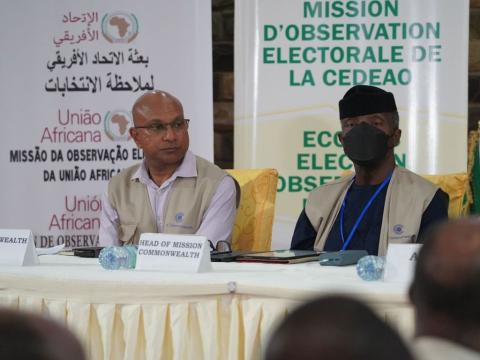By Saio Marrah
The interim statement of the Commonwealth Observer Group to Sierra Leone’s 2023 multitier elections has indicated that state institutions like the Electoral Commission of Sierra Leone (ECSL) and the Judiciary that are key to the electoral process have challenges with transparency, communication, and trust.
While reading the preliminary report at a press conference held at the Bintumani Hotel in Freetown on Monday 26th June 2023, the Chairperson of the election observation group, Professor Yemi Osinbajo, noted that concerns were raised by stakeholders about the mid-term census that was conducted in 2021, ahead of the elections, the ECSL updated voter register.
“However, we were informed by stakeholders about issues with respect to access to information provided in the voter register. We will address this further in our final report,” Osinbajo read out.
On voter education, he said several stakeholders raised concerns about insufficient communication by the ECSL throughout the electoral process noting that there were reported cases that voter education conducted was inadequate, particularly about the proportional representation system.
“We recommend that the Electoral Commission considers training for its entire staff to enhance its strategic communication capabilities, transparency, and accountability. We also recommend the creation of a dedicated funding stream for voter education,” he read out.
On issues related to early voters, the group noted that there were reports that the list of early voters was not provided to political parties prior to the early voting
Osinbajo also noted that concerns were expressed about the decision of ECSL to print the ballot papers for early voting in Sierra Leone, while ballot papers for the election on 24th June were printed in South Africa.
On transparency in the tallying of results, he noted they will provide a thorough assessment in their final report.“We note with concern, based on our observations and various reports, that there is a lack of clarity around the actual procedure for tallying, leading to charges of lack of transparency,” he pointed out.
On the morning of Election Day, pre-polling procedures and checks were followed, but sometimes the procedures were not uniformly applied by polling staff, he said.
Professor Osinbajo stressed that “Election Day was characterized by some logistical challenges, most notably the late arrival, or non-delivery in some cases, of both non-sensitive and sensitive elections materials. As a result, our observers noted the late opening of polls in many polling centres, with delays of about one to three hours in the opening of polls.”
He said the group noted that ECSL allowed polling staff to grant “pro rata” time extensions in some cases where the opening of polls was delayed.
Thus, the group recommended that the Electoral Commission review its logistical arrangements for the distribution of materials on the eve of Election Day.
While noting that media was largely free in the lead-up to elections and on Election Day and that media regulations and codes of conduct were generally adhered to, misinformation and disinformation proliferated across social media on most major platforms, which influenced the pre-election environment.
“We commend the efforts made by platforms such as I-verify as well as the Sierra Leone Association of Journalists (SLAJ) to address some of these challenges. We encourage further education and awareness-raising initiatives to equip the population, particularly young people, with the relevant knowledge and skills to identify misinformation and disinformation, as well as being more aware of their harmful impacts.”
The election observer group also recommended that adequate support and resources be provided to critical bodies such as the Independent Media Commission (IMC) and SLAJ to carry out their duties to ensure a robust framework and environment in which media can operate.
They stressed the need for additional training of polling staff on how to respond to any challenges during the conduct of their duties, to minimise such anomalies in the future.
“We urge the Electoral Commission to conduct a thorough post-election review at a suitable time, and also encourage consideration for the establishment of appropriate domestic mechanisms to take up recommendations offered by our Group,” he noted.
Copyright © 2023 Politico (28/06/23)








